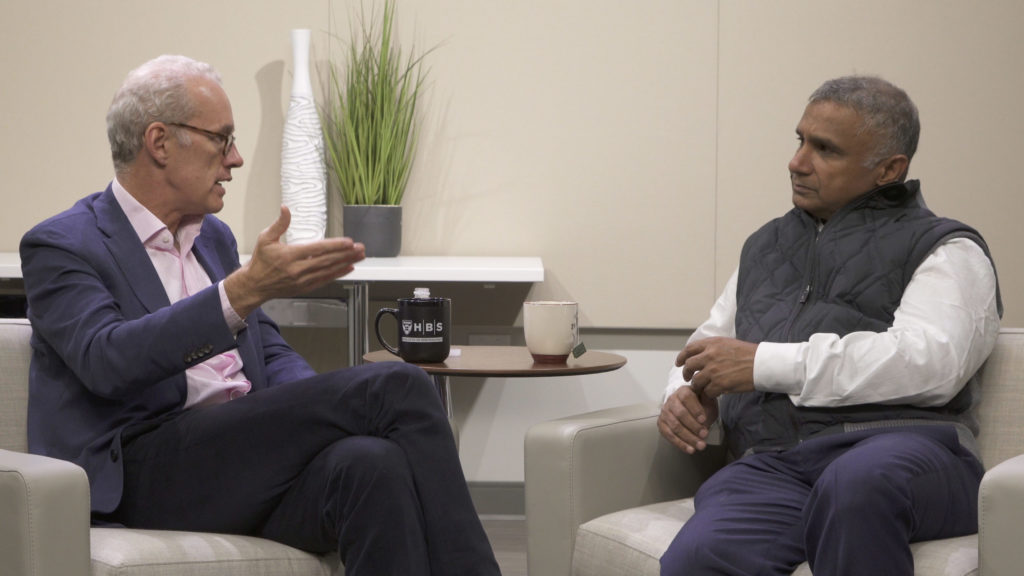
Kevin Ryan Shares Insights on What Makes Great CEOs
What qualities make a great CEO? As founder and CEO of AlleyCorp, Kevin Ryan has handpicked CEOs for each of his companies with great success. Many have grown into billion-dollar ventures. Over the years, Ryan has refined his process of identifying the most appropriate person to serve as co-founder and CEO. In this interview with Shikhar Ghosh, Ryan shares what qualities he looks for when choosing a CEO to lead one of his startups. Ryan’s tactical tips on how to evaluate the best candidates when interviewing and the metrics he uses for evaluating teams can be helpful to anyone building a team.
What Qualities Make a Great Entrepreneurial CEO?
Ryan has founded some of the most financially lucrative tech startups in New York. His companies also have reputations for having strong, close-knit teams and for being highly desirable places to work. Unlike many other ventures, companies Ryan founded have little turnover. In large part, he credits to the CEO he’s chosen. What has Ryan learned about the role and qualities of an entrepreneurial CEO from his experiences at companies like Gilt Groupe, Business Insider, Zola, and the more recent Truebird?
I try to look for two things. First is someone whose background fits the most important aspect of this company, which is generally going to be product. Because in the the first two years you’re not monetizing that much, you’re not even marketing that much. You are actually creating a product and getting part of market fit. If you don’t have that, nothing else matters.
The second trait that Ryan searches for, especially “in a competitive environment where everyone can work a twenty other places,” is more challenging to quantify because it relates to personality and people skills. “This has to be a CEO people want to work for” he stresses. He joins others on his team in conducting reference checks to find out, “Did people like this person? Did they respect this person? Did they want to work for them?”
When searching for candidates, Ryan typically doesn’t source from big established companies. He confesses, “I almost never have I hired someone from Google or Facebook or Amazon. Definitely not Proctor & Gamble or Ford or something like that.” Why? He explains that leaders at those large corporations have been trained years to make decisions “in a way that’s very different. They have all kinds of support. They have no idea how the option program was created.” In a startup, the CEO needs to have earned confidence through experience “in making all those decisions. And the CEO has got to make decisions fast—faster than you would like.”
Role of the CEO in Attracting Top Talent & Retaining Loyalty
While Ryan’s portfolio is diverse, they all share a common underlying trait: they each have talented teams that have experienced little turnover. Zola, the online wedding registry, wedding planner, and retailer he founded, has had almost no turnover in six years of senior people. Ryan sees building a strong and productive team as an essential function of the CEO. What enables a CEO to not only attract great talent but retain it and inspire loyalty?
A lot of it is just treating people fairly, setting an example for them. People want to work for someone who is working hard, is ethical, cares for them.
He notes that the CEO’s role is to hire good managers. “When DoubleClick had to go through layoffs, the industry was going badly. When people left it was because of their manager. If they thought their manager liked them and thought they were great and working with him, they would hang in there a long time. But once they lost the manager, then it was all over with.”
Why Reference Interviews Matter Most When Hiring a CEO
In most places, reference checks are a formality and a final step in the recruiting process. For Ryan, reference interviews are critical, “more important than the actual interview process.” Sharing his process for conducting reference interviews, he explains, that it requires an investment of time—”we have to spend hours getting to people who know this person. “It’s never a precise process, but if I asked six people about you, or someone else, I will start to see some commonalities. A couple of things will show up over and over. Once you start to hear something two to three times, then you can start to dive in.”
A question I would always ask is, “Would you work for this person again and do you think other people would follow? Are you worried that people will leave your company and go follow this person?”
He clarifies that the process is about more than uncovering weaknesses to help you decide whether or not to move forward in hiring. A detailed reference interview helps you understand the person from multiple angles, so you can understand what they would need to help them shine and lead your company. “I think of it as like we’re hiring a quarterback. No one in a million years thinks that a quarterback can play wide receiver—or frankly any other position on the team—but they’re still extremely valuable. Possibly the most valuable. But we need to surround them with everyone else.”

 Delivered
Delivered